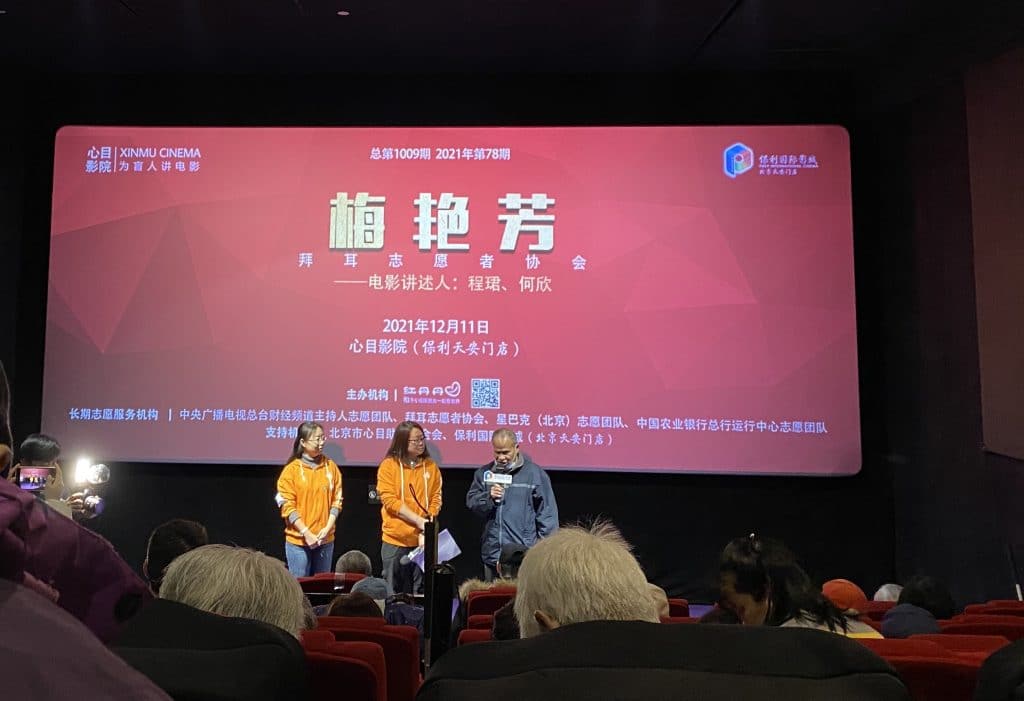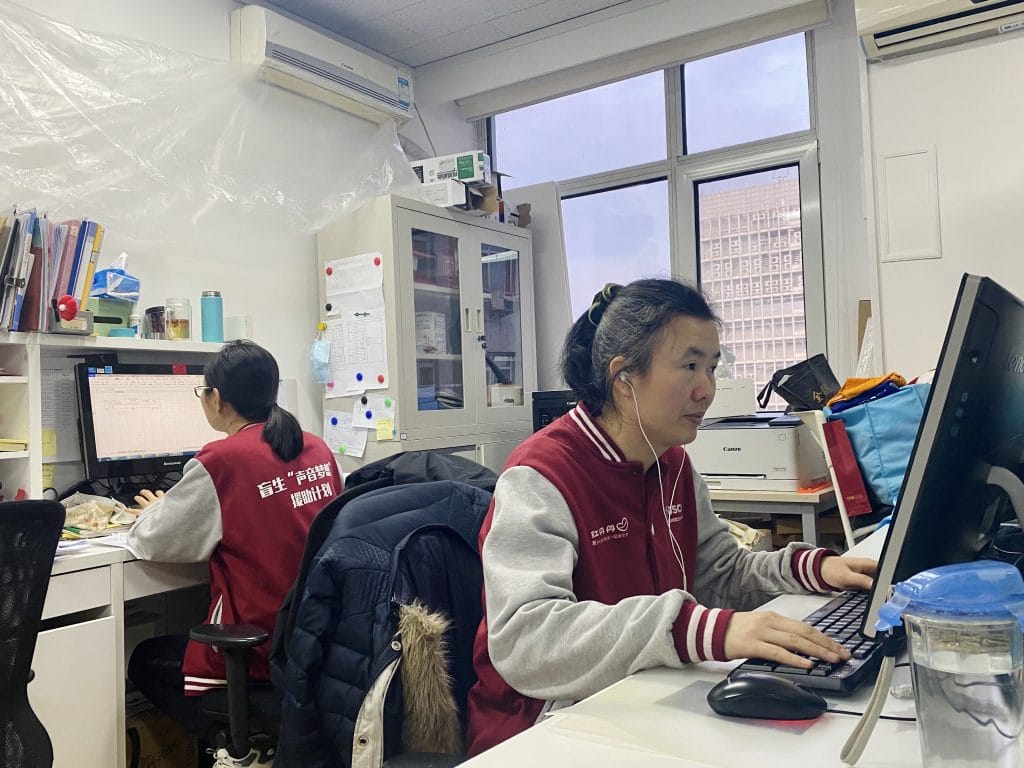This is the second part of CDB’s interview with Zeng Xin, executive director of Hongdandan, a Beijing NGO dedicated to providing services for the visually impaired. To read part one, click here.
On a chilly Saturday morning in December, Qin Mingde put on his red vest as usual and travelled over an hour by bus in order to get to Poly International Cinema’s Tiananmen movie theater on time.
Qin was heading to the ninth screen of the cinema where a new movie, Anita, will be screened via the Heart Cinema program hosted by Beijing Hongdandan Cultural Service Center for the Visually Impaired. The program screens curated movies from all over the world to a visually impaired audience every Saturday morning.
Although Qin can’t see things, the route from his home to the cinema is familiar enough for him to travel alone. For the past 16 years, he has tried to enjoy a movie every week and socialize with the friends he has made through the program and Hongdandan. Plus, he’s got the special red vest to notify people around him if he ever gets lost.
Newcomers usually wait at the bus station until Hongdandan’s volunteers pick them up and escort them into the cinema. There they will be greeted by Zeng Xin, Hongdandan’s executive director who manages the program and at the same time enjoys the movies and socializes with the blind community that she belongs to.

Fill the visual information gap
“About 80 percent of the information that our brains process is visual,” Zeng said. “For blind people who are left with only 20 percent of all that information, it is hard for us to actually integrate with society.”
The original intention of Heart Cinema was to fill that information gap, Zeng told CDB during a recent interview.
Started in 2005 at a courtyard house on Gulou Street in Beijing’s Xicheng District, and first narrated by Wang Weili, who’s now Hongdandan’s most experienced and skilled visual storyteller, Heart Cinema offers the visually impaired a multi-layered viewing experience by matching each movie with one or two visual storytellers to help add visual descriptions and explanations to the original lines of the movies.
The program soon became popular in the visually impaired community, and it also attracted donors after its activities were widely reported in the media. “Thanks to a generous individual donor, we were finally able to transfer from full-time volunteers to paid staff in 2007,” Zeng said.
Three years ago, through a new partnership with Poly International Cinema, the Heart Cinema program was moved to its current location near Tiananmen Square.
“The pandemic did get in our way; for months we were only able to do online screenings, but we tried to keep it as an offline event as much as we could to encourage the visually impaired to leave their homes, communicate with others and to participate in social life,” Zeng explained.
“Now that we’ve moved to a more public space at the cinema — away from the more closed-off space in the hutong, which our users saw as something of a comfort zone, we think we can further help the visually impaired integrate into society,” she said.
“Some of them rarely go out to public places and may lack certain social skills; for example, some were scared of taking the escalator at first, but after a while, with the help of the volunteers, they were able to manage the escalators by themselves.”
October 24 marked the 1000th screening at the Heart Cinema, and Zeng has said the movie screenings will continue. During the 17 years of the program, tens of thousands of volunteers have participated in the visual storytelling process serving over 40,000 visually impaired moviegoers, making Heart Cinema the longest-running and signature program of Hongdandan.

It’s not just about movies
It may seem natural for the organization to move Heart Cinema online, especially during the pandemic. But Qin, the program’s long-time fan, told CDB that he never attended any of the program’s online screenings because to him, the social interactions brought about by the program are more meaningful than a movie itself.
Zeng noticed this from very early on. “From our perspective, Heart Cinema is a method towards our goal of helping our users integrate into society, which can be divided into several stages,” she explained.
“To start with, we host a cultural event specifically for them, and at the same time we provide this kind of safe space for them — sometimes they need an escape from their families who struggle to understand them, and they come for a movie, even if they don’t chat with other people at the event, they can feel that this place belongs to them. We also hope to provide room for them to figure out their interests and find like-minded peers, whether that’s hosting events or singing with a choir. Moreover, we want to help build their confidence and social skills by providing them with opportunities and resources to participate in social activities through all of our existing projects.”
The Heart Cinema is not only a place for movie screenings but also a cultural and social center for the blind community, Zeng concluded. Meanwhile, anyone from outside the community who’s interested in getting to know and understand our users is also welcome to join in, she said. Each month, one of the screenings is open for members of the public to attend.
In Zeng’s vision, Hongdandan serves as a bridge — to provide barrier-free services for the visually impaired while raising public awareness of social integration.
Survive first, then grow steadily
For blind youths, Hongdandan offers the newly launched “e-seeing the world” livestream courses as well as education programs through its partnerships with blind schools across the country. For the blind community at large, they insist on hosting Heart Cinema and Heart Library, which provides audiobooks for users.
“We try to cover the diverse needs of visually impaired people of all ages. Recently for example, we have received requests to set up a special nursing home for seniors with visual impairments, which reflects a real problem but requires cooperative efforts in practice,” Zeng told CDB. “Our expertise is mainly in understanding the needs of this community and how to serve them.”
After nearly two decades serving the visually impaired community, how to pass Hongdandan’s accumulated experience on to more organizations, especially those outside of Beijing, is a lingering question for Zeng.
“Take Heart Cinema as an example, it’s quite inefficient to keep opening up courses to train new visual storytellers — we may train 10 volunteers for months and none of them end up being able to really do the job,” Zeng explained. “It’s crucial for us to figure out how to productize our experience, to turn that into a systematic, shareable curriculum.”
Looking to the future, Zeng says the priority is always to survive first, and then seek more sustainable ways to grow steadily.
“I think the major challenge for us at this stage is the problem of our project model,” she said. “NGOs need to make their own blood, that’s something we hear a lot recently, especially as the pandemic has made it harder to raise funds. For us, it is necessary for us to gradually move from traditional investment-based projects to service-oriented projects, and that requires us to adapt to the various needs of our potential customers.”
Companies and schools have faced growing demands to get to know groups with special needs in recent years, and Hongdandan’s reputation has already helped draw in customers.
Hongdandan launched a program a few years ago called “Three Days of Darkness”, which asks the sighted to blindfold themselves and experience the world like a visually impaired person.
“This year, two customers paid for our program: Beijing’s Keystone Academy now offers it as one of their weekend elective classes, while Santen Pharmaceutical includes it as part of the orientation for all its new employees,” Zeng told CDB.
The organization is looking to develop more experience courses of this kind, which can be offered in schools, giving children the opportunity to learn about the challenges faced by the visually impaired and what services they can benefit from.




